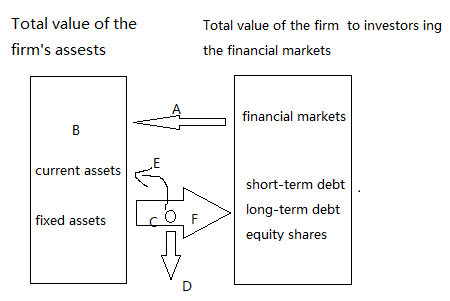Recently,i am learning some useful things about financial management by reading 《Essentials of Corporate Finance》 writed by Ross/Westerfield/Jordan.Now i will share with you.
Chapter One : Introduction to Financial Management
- Traditionally,finance are grouped into four basic Areas:
1.corporate finance
2.investment
3.financial institutions
4.international finance
and here,we just only focus on corporate finance.
- Why study finance?
1.Marketing and finance:involving with budget,marketing research,the design of marketing and distribution channels,product pricing
2.Accounting and finance
3.Management and finance
4.you and finance:financial decision in daily life
Business finance and Financial management
- what is business finance?
1.long-term investment,line of business,buildings,machinery,equipment
2.the source of long-term finance to investment,other owners or borrow money
3.manage everyday financial activities
- financial management decision:
1.Capital budgeting:process of planning and managing long-term investment,identify investment opportunities,the value of cash flows > cost,evaluating the size,timing,and risk of future cash flows is the essence of the capital budgeting
2.Capital structure:the specific mixture of long-term debt and equity the firm uses to finance its operations,should borrow?the least expensive source of funds?how and where to raise the money?
3.working capital management:a firm's short-term assets,such as inventory and short-term liabilities,such as money owed to suppliers;ensure sufficient resources to day-to-day firm's activities,operations;receipt and disbursement of cash;how much cash and inventory should keep on hand?sell on credit to customers?how will we obtain any needed short-term financing?
Forms of business Organization
- sole proprietorship 独资:keep all profits,but unlimited liability for business debts;unable to exploit new opportunities because of insufficient capital;ownership is diffcult to transfer
- Partnership 合伙 :partner share in gains and losses; unlimited liability for debts;partnership agreement
- Corporation 公司 :the separation of ownership and management;stockholders have limited liability for corporate debts;The most they can lose is what they have invested.(These are advantages.) legal person,pay taxes(double taxation:corporate level and personal level)
Limited liability company (LLc):a hybrid of partnership and corporation,operate and taxed like partnership but retain limited liability for its owners
- joint stock company,public limited company,limited liability company
The Goal of Financial Management
Understanding the goal of financial management leads to an objective basic for making and evaluating financial decision.
- Profit Maximization:some sort of long-run or average profits
net income or earnings per share?-->good or bad for firm?
long-run?-->appropriate trade-off between current and future profit?
- The goal of financial management is to maximize the current value per share of the existing stock (Maximize market price per share).Good decision increases the value of the stock.The total value of the stock in the corporation is simply equal to the value of owners' equity:Maximize market value of existing owners' equity.Don't take any illegal or unethical action.Identify goods and services in the free marketplace.
The Agency Problem and Control of the Corporation:
Ownership can be spread over a huge number of stockholders.This dispersion(分散)of ownership arguably means that management effectively controls the firms.
- Agency Relationships between stockholder and management:agency(代理人) represent interest of the principal(委托人)-->conflicts. the way an agent is compensated is one factor that affects agency problems
- Management goals:agency cost(代理成本),the agency may make the stockholder lose valuable opportunities.Management tend to overemphasize organizational survival to protect job security,and dislike outside interference(外界干涉).Independence and self-sufficiency may be important goals.
- Do management act in stockholders' interests?Depends on two factors:
1)How closely are management goals aligned with stockholder goal? the way managers are compensated.
2)can management be replaced if they donot pursue stockholder goals? control of the firm.
- Managerial Compensation:
1)option to buy stock at a fixed price,tend to change into more valuable stock
2)job prospects,get promoted,greater demand in labor market,high salaries
- Control of the firm:stockholders-->board of directors-->management,proxy fight(代理权之争),avoiding a takeover by another firm gives management another incentive to act in the stockholders' interests.
- Conclusion:
1)stockholder wealth maximization is the relevant goal of the corporation
2)at least temporarily,management goals are pursued at the expence of stockholders
- Stakeholders(利益相关者):employees,customers,suppliers,even the government,potentially has a claim(要求权) on the cash flows.
- interplay相互影响,oversimplication过分简化,detriment损害,exert施加
Finacial Market and the corporation
- cash flows to and from the firm:Financial market is just a way of bringing buyer and seller together.It's debt and equity securities that are bounght and sold.You need to make clear three questions:
1)the types of securities that are traded
2)how trading is conducted
3)who are the buyer and seller

A.Firm issues securities to raise cash B.firm invests in assets
C.firm's operation generate cash flow D.cash is paid to government as taxes.Other stakeholders may receice cash.
E.Reinvested cash flows are plowed back into firm F.cash is paid out to investors in the form of interest and dividends
- Primary versus secondary markets (一级市场、二级市场)
1.primary markets (raise money for corporation): the original sale of securities by government and corporation.there are two type of primary markets:
1)public offerings(公募):sell securities to general public
2)private offering:a negotiated sale involving a specific buyer.Avoid various regulatory requirements and the expense of public offerings,no underwriter(承销商):investment banks that specialize in selling securities to the public.
- secondary markets:these securities are bought and sold after the original sale;transaction between owner and creditor;provide the means for transferring ownership of corporate securities.
- Dealer versus auction market经销市场与拍卖市场,都属于二级市场
Dealer buy and sell for themselves,at their own risk.Broker经纪人 and agents match buyers and sellers,not own commodity.
Over-the counter market(OTC,柜台市场):traditional dealer market,dealer market in stock and long-term debt.Today,there is no central location for transaction,dealers connected electronically.
Auction market:has a physical loaction, to match those who wish to sell with those who wish to buy,dealer play a limited role.
debt securities债务证券,equity securities 权益证券,stringent苛刻的,outstanding 在外流通的
Chapter one is at an end,so let's wait for chapter two!!